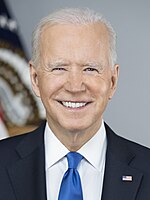
Back Élection présidentielle américaine de 2020 en Utah French 2020년 미국 대통령 선거 유타주 Korean 2020 United States presidential election in Utah SIMPLE Президентські вибори в США 2020 (Юта) Ukrainian 2020年美国总统选举犹他州选情 Chinese
| ||||||||||||||||||||||||||
| Turnout | 69.17% (of registered voters) [1] | |||||||||||||||||||||||||
|---|---|---|---|---|---|---|---|---|---|---|---|---|---|---|---|---|---|---|---|---|---|---|---|---|---|---|
| ||||||||||||||||||||||||||
| ||||||||||||||||||||||||||
| ||||||||||||||||||||||||||
| Elections in Utah |
|---|
 |
The 2020 United States presidential election in Utah was held on Tuesday, November 3, 2020, as part of the 2020 United States presidential election in which all 50 states plus the District of Columbia participated.[2] Utah voters chose electors to represent them in the Electoral College via a popular vote, pitting the Republican Party's nominee, incumbent President Donald Trump, and running mate Vice President Mike Pence against Democratic Party nominee, former Vice President Joe Biden, and his running mate California Senator Kamala Harris. Utah has six electoral votes in the Electoral College.[3]
Prior to the election, all 14 news organizations projected Utah as leaning towards Trump, or a safe red state. Throughout the campaign, Trump did not exceed 60% in a single poll conducted. Some polls even showed the president leading by single digits against Biden, likely indicating a closer than normal contest in this traditionally Republican stronghold. In past elections, Utah has often given the GOP nominee one of their largest victories in the nation, having awarded George W. Bush and Mitt Romney over 70% of the vote in 2004 and 2012, respectively. However, Trump only won Utah with 58.1% of the vote and a margin of 20.5%, which although an improvement on his 18.1% margin over Hillary Clinton in 2016, is still relatively narrow compared to past Republican nominees. He performed strongly in rural areas, as well as in some larger counties like Utah (Provo), Davis (Farmington), and Weber (Ogden). Trump improved over his 45.5% plurality win in 2016, due in part to the lack of a strong third party presence, as Evan McMullin, who endorsed Biden,[4][5] earned 21.5% of the vote that year. The election was far more of a two-party contest in 2020, with third parties receiving 4.2% of the vote, compared to 27% in 2016. Despite this, the Associated Press reported a less partisan and more cooperative cultural environment in Utah compared to other states during the election.[6]
With no major third-party challenges, Trump improved his vote share by 13% while Biden improved on Hillary Clinton's 2016 results by 10.3 percentage points. Biden's improvement garnered him the highest percentage by a Democratic presidential nominee in Utah since Lyndon Johnson won with 54.9% of the vote in 1964, as Biden overtook the vote shares of Hubert Humphrey in 1968, Barack Obama in 2008, and Jimmy Carter in 1976 (the only other Democratic nominees to surpass a third of the state's vote since 1964). Biden's greatest support came from Salt Lake County, the state's most populous county, where he won 53.7%, the first outright majority for a Democratic nominee in the county since Johnson in 1964. Biden also won Summit County (Park City), which, along with Salt Lake, was one of two counties in the state Hillary Clinton had carried in 2016 (and the only one where she had won a majority); and he flipped Grand County (Moab), which had voted Democratic in 1992 and 2008.[7]
Per exit polls by the Associated Press, Trump's strength in Utah came from Mormons. 53% of voters identified as Mormons, and Trump received 72% of their votes.[8] Trump also won the suburban areas, which make up 57% of the state, with 54% of the vote.[9]
Utah is also one of the six states (along with Arkansas, Nevada, California, Florida, and Hawaii) as well as the District of Columbia in which Trump’s margin increased from 2016.
- ^ "Voter turnout in United States elections". Ballotpedia. Retrieved August 4, 2022.
- ^ Kelly, Ben (August 13, 2018). "US elections key dates: When are the 2018 midterms and the 2020 presidential campaign?". The Independent. Archived from the original on August 2, 2018. Retrieved January 3, 2019.
- ^ "Distribution of Electoral Votes". National Archives and Records Administration. Retrieved January 3, 2019.
- ^ "Former presidential candidate Evan McMullin endorses Rep. Ben McAdams in Utah race". www.ksl.com. Retrieved December 29, 2020.
- ^ "'Utah Politics' podcast: Evan McMullin on foreign election interference and QAnon". The Salt Lake Tribune. Retrieved December 29, 2020.
- ^ Sullivan, Tim (December 17, 2020). "AP ROAD TRIP: Amid American rancor, a dash of Utah Nice". Associated Press. Retrieved December 18, 2020.
- ^ "The Political Graveyard: Grand County, Utah". politicalgraveyard.com. Retrieved November 18, 2020.
- ^ "Utah Voter Surveys: How Different Groups Voted". The New York Times. November 3, 2020. ISSN 0362-4331. Retrieved November 17, 2020.
- ^ "Utah Voter Surveys: How Different Groups Voted". The New York Times. November 3, 2020. ISSN 0362-4331. Retrieved November 17, 2020.
© MMXXIII Rich X Search. We shall prevail. All rights reserved. Rich X Search



